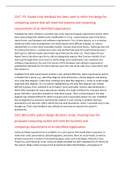22/C. P5- Explain how feedback has been used to refine the design for
computing system that will meet the business and computing
requirements of an identified organisation.
Feedback has been utilised in a positive way as for input and output requirement section there
were many things that needed some modification in it e.g., screen layouts, data entry forms,
report forms, and hardware and software requirements. First, Screen layouts, as a co-worker
noted out while I was creating them, the initial layouts were difficult to grasp, so I had to
rebuild them in a much more accessible manner. Second, Data entry forms, I had to go over the
first data entry forms, I created once more and clarified how each form performed because I
didn't get to sufficient depth about what input field was for what, etc. Third, Report forms,
Report forms, like data input forms, did not adequately express their function initially, thus I
had to go through them once more to clarify things more extensively. Last, hardware and
software requirements, the very first version of the hardware and software requirements
specified the demands for the client side but never the real server side, thus I have had to add
that section in.
Feedback from data requirements section is also utilised efficiently. Data requirements section
is divided into 4 pieces e.g., data flow diagram, data dictionaries, activity diagram and testing.
First, data flow diagram, rather than creating many data flow diagrams, I chose to create single
large data flow diagram. As a co-worker highlighted up, the data flow diagram was initially
difficult to grasp, thus I polished it up to make it more accessible. Second, data dictionaries, I
didn't offer examples for every data phrase initially, this made it difficult for everyone else to
grasp, therefore I provided examples to help others grasp. Third, activity diagram, the data
diagram was initially difficult for others to grasp since it was poorly drawn out, but I modified
the arrangement so everyone could entirely explore it. Last, testing, A problem that was
presented to me was that I didn't define the test data boundaries, which I corrected once it was
brought up. That’s how feedback was utilised on each step to improve the system’s
productivity.
22/C.M3 Justify system design decisions made, showing how the
proposed computing system will meet the business and
computing requirements of an identified organisation.
Cartes de Mode requested me to establish an e-card system that would allow consumers to
make their cards personalised, add photographs, and share them on social media, as well as
provide consumers a variety of animated designer cards such as Birthday, Valentine's Day,
Thank You, and Christmas cards. Cartes de Mode provided me with a detailed list of criteria for
the system: Make a diary to keep track of important dates like birthdays, a fast glance of




